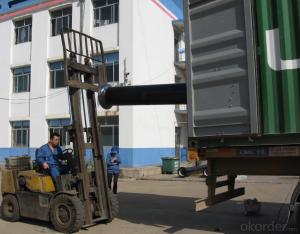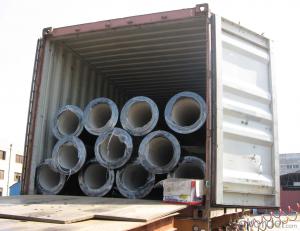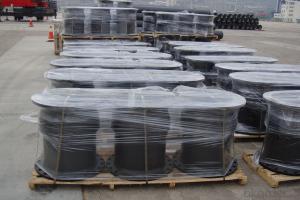DUCTILE IRON PIPES K8 DN250
- Loading Port:
- China Main Port
- Payment Terms:
- TT OR LC
- Min Order Qty:
- -
- Supply Capability:
- -
OKorder Service Pledge
OKorder Financial Service
You Might Also Like
Ductile Iron Cast Pipe is without any defects compare with tradition casting tech, which has many advantages particularly as follow:
(1) High density. In the "vertical upward casting" process, the melt iron of centre liquid column in center crystallizer is continuously feeding for volume shrinkage caused by condensation tube at outer circumference , which lead to be free of shrinkage porosity.
(2) High purity. When melt iron pouring, the mixed impurities such as gas, dross, sand grain which are lighter than melt iron could be eliminated at furnace mouth, its impossible to enter into the crystallizer through the channel, so the melt iron into the crystallizer is very pure.
(3) Strength with toughness. The cooling speed provided by continuous crystallizer is 30 times than sand casting and 5 times than centrifugal casting, and doesn't produce white iron, the eutectic cell volume of continuous cast iron is one eighth to one tenth compare with traditional cast iron. The density of graphite nodule in ductile iron can reach 300-700 pcs/mm2. Therefore, all reason above improve the strength and toughness of continuous cast iron.
(4) Free machining. The high speed cooling make the hardening phase (such as boride, steadite) not appear like reticular, massive or thick, but diffuse like fish bone and pane in shape, moreover, there are tiny graphite flakes inlaid hardening phase. It's free machining in BrinellHardness the range of 250-300HB. However, the Brinell Hardness of 250 is top limit to common metal materials.
(5) Uniform composition of tube wall. The convection mixing of liquid column caused by marching type drawing in crystallizer make the composition of tube wall well-distributed, and concentration gradient very little.
(6) High productivity. To the wall thickness of tube under 10mm, the speed of continuous casting is 1 meter/min, to the wall thickness of tube under 20mm, the speed of continuous casting is 0.5 meter/min, which is high efficiency that centrifugal or other casting tech couldn't reach.
- Q:Can ductile iron pipe be used for wastewater treatment plant applications?
- Yes, ductile iron pipe can be used for wastewater treatment plant applications. It is known for its durability, corrosion resistance, and ability to withstand high-pressure environments, making it suitable for transporting wastewater in such facilities.
- Q:Can ductile iron pipes be used in areas with high soil salinity?
- Indeed, areas with high soil salinity can accommodate the use of ductile iron pipes. These pipes possess notable resistance to corrosion, rendering them compatible with different soil conditions, even those with elevated salinity levels. Usually, these pipes are coated with a safeguarding layer, such as polyethylene or zinc, which bolsters their capacity to ward off corrosion caused by saltwater or saline soils. Furthermore, employing appropriate installation methods, such as meticulous backfilling and soil compaction around the pipes, can effectively mitigate the potential consequences of high soil salinity on the durability and effectiveness of ductile iron pipes.
- Q:How are ductile iron pipes protected against stray electrical currents?
- Ductile iron pipes, which are commonly used for water and sewer systems, are protected against stray electrical currents through a process known as cathodic protection. This method involves applying a low-voltage direct current (DC) to the pipes, which creates a protective electrical field around them. Cathodic protection is achieved by installing sacrificial anodes or impressed current systems near the ductile iron pipes. Sacrificial anodes, typically made of a more electrically active metal such as zinc or magnesium, are connected to the pipes and serve as the source of electrical current. These anodes corrode over time, sacrificing themselves to protect the pipes from corrosion due to stray electrical currents. Impressed current systems, on the other hand, utilize an external power source to supply the protective electrical current. Rectifiers are used to convert alternating current (AC) to direct current (DC) and the DC is then applied to the pipes through anodes. This method allows for more control over the amount of current being applied, ensuring optimal protection. In both cases, the electrical current flowing through the sacrificial anodes or impressed current systems creates a protective barrier around the ductile iron pipes. This barrier prevents the stray electrical currents from flowing through the pipes, reducing the risk of corrosion and extending the lifespan of the infrastructure. Regular monitoring and maintenance of the cathodic protection system are essential to ensure its effectiveness. This involves inspecting the anodes, checking the electrical current levels, and making any necessary adjustments or replacements to maintain the desired level of protection. Overall, cathodic protection is a reliable and widely used method to protect ductile iron pipes against stray electrical currents, safeguarding the integrity and longevity of water and sewer systems.
- Q:Are ductile iron pipes suitable for installation in areas with high soil compaction and traffic loads?
- Yes, ductile iron pipes are suitable for installation in areas with high soil compaction and traffic loads. Ductile iron pipes have high tensile strength and are highly resistant to external loads, making them ideal for areas with heavy traffic and compacted soil. They are designed to withstand the pressure and stress caused by the movement of heavy vehicles and the weight of the soil above them. Additionally, ductile iron pipes have excellent flexibility, allowing them to absorb and distribute the load more effectively, reducing the risk of damage or failure. Therefore, they are a reliable choice for installation in areas with high soil compaction and traffic loads.
- Q:How are ductile iron pipes restrained against axial thrust forces?
- Axial thrust forces are effectively restrained in ductile iron pipes by utilizing both mechanical restraints and soil resistance. A commonly employed method involves the use of thrust blocks, which are concrete structures constructed at bends, tees, and other directional changes in the pipeline. These blocks are specifically designed to withstand axial forces and prevent any shifting or movement of the pipes caused by the pressure exerted by the flowing fluid. Furthermore, additional support and prevention of axial movement are achieved through the implementation of mechanical restraints, such as pipe restraints, thrust collars, and anchor blocks. Pipe restraints are devices installed around the pipe and connected to adjacent structures, such as walls or concrete collars, in order to prevent any sort of movement. Thrust collars, on the other hand, are utilized to absorb and distribute the thrust forces generated by the flowing fluid. These collars, typically made of ductile iron or steel, are securely fastened around the pipe to counteract axial movement. Moreover, soil resistance plays a crucial role in restraining axial thrust forces. The weight of the soil surrounding the pipe creates frictional resistance, which effectively counteracts the axial forces. In order to ensure effective soil resistance, it is vital to properly backfill the trench, compact the soil, and adequately embed the pipe in the soil. In conclusion, a comprehensive approach involving the use of mechanical restraints such as thrust blocks, pipe restraints, and thrust collars, along with the soil resistance provided by proper trench backfilling and compaction, is employed to restrain axial thrust forces in ductile iron pipes. This approach guarantees the secure placement of the pipes and their ability to withstand the axial forces exerted by the flowing fluid.
- Q:Is it better to use steel tubes or ductile iron pipes for water supply?
- Flexible seamless steel pipe is good toughness, good processing, better than ductile iron corrosion resistance, the price is slightly higher;
- Q:What are the typical applications for ductile iron pipes?
- Ductile iron pipes are commonly used for a variety of applications including water and sewage transportation, irrigation systems, fire protection systems, and industrial processes. They are also suitable for underground and aboveground installations due to their durability, corrosion resistance, and ability to handle high pressure and heavy loads.
- Q:Are ductile iron pipes suitable for gravity flow applications?
- Ductile iron pipes are indeed suitable for gravity flow applications. This material, known for its strength and durability, can easily bear the weight of water and solid waste flowing through the pipes without encountering any problems. It possesses exceptional tensile strength and can withstand external forces like soil movement or heavy traffic loads without sustaining damage. Moreover, the inner surfaces of these pipes are smooth, ensuring efficient flow and minimal friction losses. Additionally, ductile iron pipes are resistant to corrosion and can last for several decades without necessitating frequent maintenance or replacement. In conclusion, ductile iron pipes are a dependable option for gravity flow applications due to their robustness, longevity, and ability to resist various environmental factors.
- Q:Ductile cast iron can replace copper sleeve
- The tensile and compressive capacity of the ball milled cast iron is not as good as that of copper. The hardness of Rongchang graphite copper sheath can reach HB210
- Q:Are ductile iron pipes prone to leakage?
- Ductile iron pipes are generally considered to be resistant to leakage. This type of pipe is known for its durability and strength, making it less prone to leaks compared to other materials like PVC or even cast iron pipes. Ductile iron pipes are designed to withstand high pressure and can withstand heavy loads, making them ideal for various applications such as water supply, sewage systems, and industrial pipelines. The unique properties of ductile iron, including its flexibility and ability to absorb vibrations and shocks, contribute to its resistance against leaks. Ductile iron pipes have a high tensile strength, which means they can handle the internal and external pressures exerted on them without cracking or breaking. Furthermore, ductile iron pipes have joints that are designed to be leak-proof. These joints are typically sealed with rubber gaskets and connected using various methods such as push-on joints or restrained joints with mechanical couplings. These joint designs ensure a secure and watertight connection, reducing the risk of leaks. However, like any other type of pipe, ductile iron pipes can still experience leaks under certain circumstances. Factors such as age, corrosion, poor installation, or ground movement can contribute to the development of leaks over time. Regular maintenance and inspections are important to identify and address any potential issues that may lead to leaks. Overall, while ductile iron pipes are generally resistant to leakage and known for their reliability, it is essential to ensure proper installation, regular maintenance, and timely repairs to maximize their longevity and prevent any potential leaks.
1. Manufacturer Overview |
|
|---|---|
| Location | |
| Year Established | |
| Annual Output Value | |
| Main Markets | |
| Company Certifications | |
2. Manufacturer Certificates |
|
|---|---|
| a) Certification Name | |
| Range | |
| Reference | |
| Validity Period | |
3. Manufacturer Capability |
|
|---|---|
| a)Trade Capacity | |
| Nearest Port | |
| Export Percentage | |
| No.of Employees in Trade Department | |
| Language Spoken: | |
| b)Factory Information | |
| Factory Size: | |
| No. of Production Lines | |
| Contract Manufacturing | |
| Product Price Range | |
Send your message to us
DUCTILE IRON PIPES K8 DN250
- Loading Port:
- China Main Port
- Payment Terms:
- TT OR LC
- Min Order Qty:
- -
- Supply Capability:
- -
OKorder Service Pledge
OKorder Financial Service
Similar products
New products
Hot products
Related keywords



























